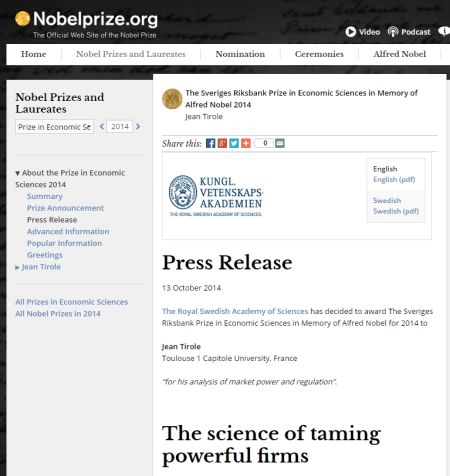新浪财经讯 北京时间10月13日晚间消息,法国经济学家梯若尔因对市场力量和监管的研究,获得2014年诺贝尔经济学奖,以下为诺奖委员会给出的获奖理由。
梯若尔跻身当今最具影响力的经济学家之列,他在众多领域做出了重要的理论研究贡献,他最杰出的成就是阐明了如何理解和监管由数家公司巨头主导的行业。
很多行业为数家大型公司或单个寡头控制。监管缺失,类似市场的产物都不受社会欢迎:非成本因素造成的价格高企,或是效率低下的公司通过阻碍新的、更高效的公司进入市场而存活。
1980年代中期以来,梯若尔向该类市场失败的学术研究中注入了新生命。他对市场强权公司的分析提供了一个统一的理论,提出了一个强有力的中央政策问题:政府如何应对公司合并或卡特尔,以及应该如何监管垄断性公司?
在梯若尔之前,研究人员和政策制定者寻求适合所有行业的总体规则。他们倡导简单的政策规则,如为寡头设定价格上限、禁止竞争者之间串通,但允许价值链上位置不同的公司进行合作。梯若尔的理论显示,这些监管规则或在特定状况下有效果,但在其他情况下则弊大于利。
价格上限能为统治性公司提供削减成本的有力动机,这有利于社会利益,但价格上限也可能会允许过度利润存在,这又不利于社会。市场中在定价上进行合作通常有害,但专利上的合作能够造福社会。一家公司和其供应商合并可以鼓励创新,但也会扭曲竞争。
因此,最佳的监管或竞争政策应该审慎地适应各个行业特定的状况。在一系列的文章和著述中,梯若尔阐述了设计这类政策的基本框架,以及如何让其适应于一 系列的行业,其范围从电信业直至银行业等。借助这些新的理念,政府可以更好地鼓励强大的公司变得更具创造力,同时又防范它们伤害竞争和客户。(谷云)
英文颁奖词如下:
The science of taming powerful firms
Jean Tirole is one of the most influential economists of our time. He has made important theoretical research contributions in a number of areas, but most of all he has clarified how to understand and regulate industries with a few powerful firms。
Many industries are dominated by a small number of large firms or a single monopoly. Left unregulated, such markets often produce socially undesirable results – prices higher than those motivated by costs, or unproductive firms that survive by blocking the entry of new and more productive ones。
From the mid-1980s and onwards, Jean Tirole has breathed new life into research on such market failures. His analysis of firms with market power provides a unified theory with a strong bearing on central policy questions: how should the government deal with mergers or cartels, and how should it regulate monopolies?
Before Tirole, researchers and policymakers sought general principles for all industries. They advocated simple policy rules, such as capping prices for monopolists and prohibiting cooperation between competitors, while permitting cooperation between firms with different positions in the value chain. Tirole showed theoretically that such rules may work well in certain conditions, but do more harm than good in others. Price caps can provide dominant firms with strong motives to reduce costs – a good thing for society – but may also permit excessive profits – a bad thing for society. Cooperation on price setting within a market is usually harmful, but cooperation regarding patent pools can benefit everyone. The merger of a firm and its supplier may encourage innovation, but may also distort competition。
The best regulation or competition policy should therefore be carefully adapted to every industry’s specific conditions. In a series of articles and books, Jean Tirole has presented a general framework for designing such policies and applied it to a number of industries, ranging from telecommunications to banking. Drawing on these new insights, governments can better encourage powerful firms to become more productive and, at the same time, prevent them from harming competitors and customers。


